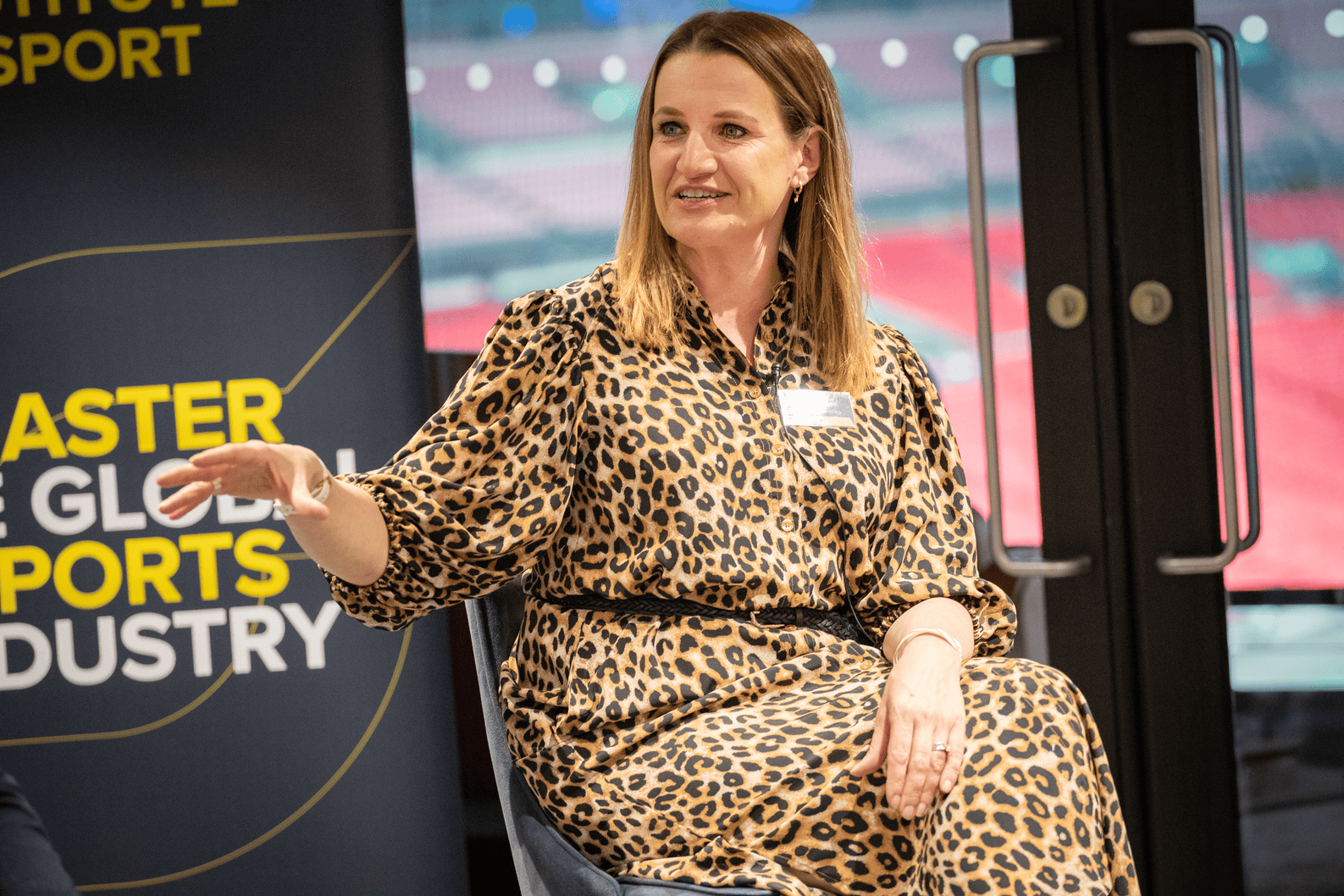Follow Your Passion: Lynsey Hooper Guest Speaker Session

As part of our guest speaker sessions at GIS, students had the opportunity to hear from Lynsey Hooper, one of the most experienced sports broadcasters in the country, and one of the hosts of our GIS Insight Series.
Lynsey shared insights on her journey, the highs and lows of her career, and key advice for aspiring sports professionals.
Playing three different sports at the county level, Lynsey began her journey at Loughborough University as a cross-country runner. An elite competitor, she trained under the same coach as Paula Radcliffe but quickly realised the intense competition at Loughborough.
“I realised Loughborough was on a whole new level. I was really humbled and I realised I wasn’t as good as I thought I was”, she explained.
This realisation is what made her so determined to succeed elsewhere, demonstrating that every setback offers a lesson.
“It’s probably the failure of not being able to be the best at something, which is what I always wanted to be in sport, that really pushed me into wanting to cover the people that are the best and become a sports journalist.”
Having gained experience with hospital radio, Lynsey began volunteering with student radio and TV at university to develop her broadcasting skills.
She emphasised that unpaid work often sets candidates apart when applying for jobs, outlining how the experience gained from freelancing was crucial in her career progression.
“I kept getting interviews and getting down to the last 2-3 candidates but being told I needed more experience, so I had to become more freelance, which is why I’ve got such a long list of experience because I’ve freelanced for so many different people.”
This approach led her to work with major organisations, presenting for the BBC, Liverpool, Chelsea, and the team she supports,, Wolverhampton Wanderers.
Now at Sky, Lynsey has secured a dream role, highlighting the effort and patience required to reach this point.
“If I was told when I was younger that I’d get this role then I probably wouldn’t have believed it, but it’s come at the end of what’s been a long, labourish journey- it did not come overnight. I’ve been broadcasting for over 20 years and people think this is the first job I’ve done.”
With many media students on the call, Lynsey shared some advice for those looking to pursue a career like hers, explaining that, “If you’re a good reporter, it’s never about you.
“It’s the athletes that have won gold medals and scored at World Cups, and I’m really, really good at it not being about me, so that’s one of the things that has equated to me having such a long career.”
When asked about her favourite sporting moment, Lynsey highlighted the Lionesses’ Euros victory.
“Reaching this point felt like more than just a sporting moment. It felt like a shift in the whole of society and the world, in terms of the message you put out for valuing women’s sport and pushing towards equality.”
She then shared three key pieces of advice for GIS students:
Passion:
“Find out what you’re really passionate about. The one thing you can see in different broadcasters is whether they really live and breathe it.
“If you’ve got a passion, immerse yourself in it. The beauty of having a phone nowadays is that it’s like having a portable film crew, and it lets you practice.”
Persistence:
Lynsey related to the struggles young industry professionals and graduates face when starting out.
“Any student on here will have experienced what I did years ago where sometimes you don’t get a reply, sometimes you get pushed back or told you’ll be kept on file, but persistence is what breaks through.”
Positioning:
She advised students to demonstrate their value to employers rather than waiting for opportunities to come to them.
“It shouldn’t always be that you approach people asking things of them. I think you should approach them showing that you’ve done your research and asking if there’s anything you can do for them,” she said.
Reflecting on her career and the sports media industry, Lynsey acknowledged both the challenges and the rewards.
“If you spoke to a lot of my colleagues, they’ve covered the best sporting events in the world and might not have been paid a fortune to do so, but they’ve witnessed some of the best moments.
“If you’re getting into the media, I wouldn’t do it for the money. It’s a difficult area for sports broadcasting to make a good income, so if you want the fast cars and all of that there are probably other areas, but would you be an enriched person? Could you make a difference? Would you be doing something where you feel like you’ve never worked a day in your life? I think those things are very valuable.”
This came the day after Sir Gareth Southgate gave the BBC’s annual Richard Dimbleby Lecture, where he spoke against the current culture of young people “believing that success is measured by money.”
Lynsey agreed with Sir Gareth, adding, “when I think about my own life and career, the things that matter to me are the experiences, not the monetary things.”
“I’ve had many ups and downs, trust me, but if there’s something that you really want to pursue, it might not come easily but it will come if you persist.”
To hear from more of our industry-leading https://gis.sport/events/ or to find out more about our courses as you begin your career in the sports world, click here.
Article by Zakaria Anani
You may also be interested in

Scholarships
July 22, 2025 |
Global Institute of Sport and Women in Soccer partnership expands to two master’s degree scholarships in football business
Read Post

Latest news
January 6, 2026 |
The Global Appeal of Darts and Its Impact on the Sports Industry
Read Post

Alumni
December 12, 2024 |
Brad Guzan: MLS goalkeeper by day, GIS student by night
Read Post
Our Partners













